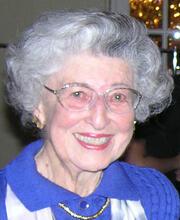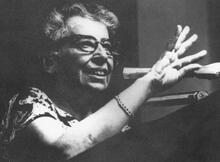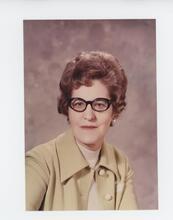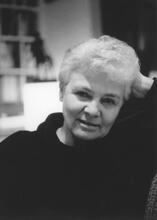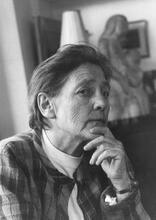Eleanor Glueck
Eleanor Glueck and her husband Sheldon Glueck did massive statistical modeling and follow-up studies to uncover the roots of criminal behavior, revolutionizing the field of criminology. Eleanor Touroff Glueck studied at the New York School of Social Work under Bernard Glueck, who not only recommended her as head social worker at the Dorchester Community Center in Boston but also introduced her to his brother, Sheldon, whom she married in 1922. The couple joined the Harvard Law School Research Project into the Causes, Treatment, and Prevention of Juvenile Delinquency. Eleanor organized all data from their projects, officially serving as research assistant from 1929 to 1953 and research associate from 1953 to 1972 before becoming co-director (with Sheldon) in 1966. Their studies were large and followed participants for years. Some of their most prominent studies examined which criminals were likely to reoffend, while another assessed the childhood indicators of criminality.
For half a century, Eleanor Glueck worked with her husband, Sheldon, professor of criminology at Harvard Law School, producing basic longitudinal studies of juvenile delinquency and adult crime. Influenced by Dr. Richard Cabot to use follow-up studies as part of medical therapy, the Gluecks applied this concept for the first time to the study of criminals sentenced to reformatories, investigating the etiology, patterns, development, and unfolding of criminal careers. The results were more than twelve books and some thirty thousand items in joint papers. Unusual in size and extensive follow-up and coverage, the studies were also characterized by an interdisciplinary perspective rare and unappreciated at the time.
Personal Life
Eleanor (Leonia) Touroff Glueck, the first of two children, was born on April 12, 1898, to Anna (Wodzislawska) and Bernard Leo Touroff, Jewish immigrants from Poland and Russia, respectively. Both her parents were well-read and financially comfortable, as her father, trained in the law, had a real estate business. Eleanor attended Hunter High School, took a degree in English at Barnard College in 1920, and went to the New York School of Social Work, studying with Bernard Glueck, a psychiatrist at Sing Sing Penitentiary in Ossining, New York, who was interested in criminology. Bernard Glueck recommended her for the post of head social worker in Boston at the Dorchester Community Center. He also introduced her to his law student brother, Sheldon, whom she married on April 16, 1922. Eleanor Glueck was research assistant (1929–1953) and later research associate (1953–1972) of the Harvard Law School Research Project into the Causes, Treatment, and Prevention of Juvenile Delinquency. From 1966 until her death in 1972, she was, with Sheldon Glueck, codirector of the program. Harvard awarded the Gluecks honorary Sc.D. degrees in 1958, and Barnard College bestowed its Distinguished Alumna Award on Eleanor Glueck in 1969.
Work
Commentators on the Gluecks’ work have emphasized the meticulous gathering of data and the precision of the follow-up procedures, wherein the same group of subjects was examined at intervals over a span of years to test the validity and continuing applicability of the original findings. Such long-term studies of criminal careers were unique, and in the division of labor, it was Eleanor Glueck who dealt primarily with the organization of the data.
Their first joint effort was Five Hundred Criminal Careers (1930), based on the study of offenders in the Massachusetts Reformatory between 1911 and 1922 for five years after completion of parole. A follow-up study resulted in two more books: Later Criminal Careers (1937) and Criminal Careers in Retrospect (1943). Their second project addressed women imprisoned in the Framingham, Massachusetts, Women’s Reformatory, resulting in Five Hundred Delinquent Women (1934). The third concerned juveniles referred by the Boston Juvenile Court to the Judge Baker Foundation (of which Eleanor Glueck was a trustee). This, One Thousand Juvenile Delinquents (1934) and its sequel Juvenile Delinquents Grown Up (1966), revealed continuing high levels of criminal activity.
After this productive decade came Unraveling Juvenile Delinquency (1950), their best-known work and one of the bases for their continuing importance for criminology. This ten-year study looked at the criminal careers of five hundred delinquent and five hundred nondelinquent white boys from disadvantaged backgrounds in Boston and reassessed them at ages seventeen, twenty-five, and thirty-one. Matched for intelligence, ethnicity, and residence, the two sets of boys were examined through their peer groups, teachers, projective tests, and body types. Extensive personal interviews with peers, teachers, families, and friends comprised the data. The results pointed sharply to the crucial role of the family in generating or preventing juvenile delinquency. Family cohesion and parental affection, supervision, and consistent discipline were central to the issue. They tracked these boys for fifteen years, and the results appeared in Delinquents and Non-Delinquents in Perspective (1968). The “Social Prediction Tables,” an effort to identify potential delinquents from age six, based on what had been learned about older offenders, came from this research (and have been much criticized).
Challenges
Even this sketchy report reveals the unparalleled body of materials the Gluecks produced for the study of delinquency and crime. Their extensive, carefully organized studies came to have extraordinary significance even for the present. Their work was not always well-received, and they were criticized for various methodological questions and interpretations. Their research, though supported by the Harvard Law School, was not central to the institution’s focus.
As well, the climate for women professionals was not welcoming. Eleanor Glueck, though a full partner in the joint work and the sole author of other books, occupied a position offered to Ph.D. candidates. No possibility existed for tenure or anything faintly commensurate with her work or its value. In addition, the very breadth of their work, embracing law, social work, education, economics, psychology, and physiology, was unusual in more narrowly constructed academic environments.
Their own tight-knit family life (they had one child, Anitra Joyce, a poet, who died in 1956 at age thirty-two) contributed to a certain isolation from the mainstream.
Eleanor Glueck died in a drowning accident in Cambridge, Massachusetts, on September 25, 1972.
Selected Works
Glueck, Eleanor, and Sheldon Glueck. The Gluecks’ Adventure in Japan: May 28th-July 3rd 1960. Tokyo: Obun, 1962.
With Sheldon Glueck
Glueck, Sheldon, and Eleanor Glueck. Criminal Careers in Retrospect. Oxford: Commonwealth Fund, 1943.
Glueck, Sheldon, and Eleanor Glueck. Five Hundred Criminal Careers. Oxford: Knopf, 1930.
Glueck, Sheldon, and Eleanor Glueck. Five Hundred Delinquent Women. Oxford: Knopf, 1934.
Glueck, Sheldon, and Eleanor Glueck. One Thousand Juvenile Delinquents. Cambridge: Harvard University Press, 1934.
Glueck, Sheldon, and Eleanor Glueck. Unraveling Juvenile Delinquency. Oxford: Commonwealth Fund, 1950.
BEOAJ.
EJ, s.v. “Glueck, Sheldon”.
Glueck, Eleanor, and Sheldon T. Glueck. Papers. Harvard Law School Library, Cambridge, Mass.
Kaplan, Benjamin, and Felicia Kaplan, and John Laub. Personal interviews with author.
Laub, John H., and Robert J. Sampson. “The Sutherland-Glueck Debate: On the Sociology of Criminological Knowledge.” American Journal of Sociology 96, no. 6: 1402–1440, and “Unraveling Families and Delinquency: A Reanalysis of the Gluecks’ Data.” Criminology 26, no. 3 (1988): 355–379.
NAW modern.
Obituary. NYTimes, September 26, 1972, 50:1.
UJE, s.v. “Glueck, Sheldon”.
WWIAJ (1938).
WWWIA 5.

